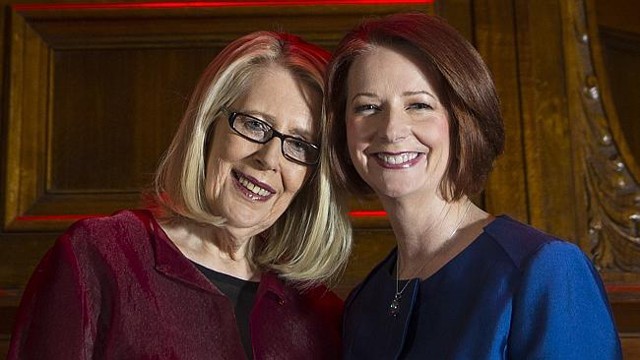Julia Gillard explained her opposition to gay marriage by arguing that the institution of marriage is anachronistic. Fine, but then she needs to make the case for abolishing it for everyone.
Former prime minister Julia Gillard is no stranger to unyielding questions about her personal opposition to marriage equality. Her interview with writer Anne Summers last night was no different when a child in the audience asked simply: “How come you didn’t let gay people get married?”
Gillard justified her position with a critique: marriage is an anachronistic institution. Gillard’s view on marriage is hardly new. In fact, as she pointed out, feminists in past decades have put forward a robust critique of marriage, given that it treated women as objects of exchange moving from their fathers’ hands to their new husbands’. This is not some distant history. For example, it was not until the 1990s – well after Gillard had begun her feminist activism – that women across Australia were afforded explicit legal protections against all forms of sexual assault in marriage.
Why then do we still bother with marriage at all? Gillard argues that we need to think beyond marriage to develop alternative institutions to value intimacy: “We could come up with other institutions that value partnerships, value love, value lifetime commitment.”
Her argument is an important one. After all, not everyone wants a certificate to prove just how much they love their partner. No one should have to get married to access legal benefits and responsibilities, either. Feminists led the way on this issue when they lobbied for de facto relationship recognition in Australia back in the 1980s. Now, couples who live together for a significant period of time (including same-sex couples since 2008) but who are not married are treated virtually the same as married ones when it comes to tax, superannuation, Medicare, property disputes, veteran’s affairs, and immigration. Gillard’s point also resonates with many queer activists and academics who argue that focusing on marriage as the only legitimate/valuable institution for recognising relationships disqualifies many other forms of kinship.
Wedged in between these thoughtful statements, however, is an extremely confusing one. Gillard says, “I think that marriage in our society could play its traditional role.”
Say what? It’s rather odd that after reminiscing on fathers literally “giving away” their daughters and demonstrating more than a little palpable distaste for wearing a white dress (given its association with virginity), Gillard should think this version of traditional marriage has any role to play in contemporary society. If “traditional” marriage subjugates women, then like any form of oppression, the logical approach would be to end it. Gillard even points out that we should not be sentimental about something just because it is a part of our culture or history. After all, land dispossession, forced removal of children, and racist immigration restrictions are part of our history too.
So, what then was the problem with Gillard not supporting marriage equality?
It’s not the “marriage” critique that’s at issue – the feminist critique is quite apt on that front. Rather, it’s the “equality” bit that she skips over.
In a liberal democracy – one that values equality before the law – public institutions should not be able to discriminate on the basis of sexual orientation, gender identity or intersex status. While Gillard was able to choose whether or not she would get married, many couples are denied the individual right to make that decision for themselves. Gillard’s argument also ignores the fact that the current definition of marriage excludes intersex people. It also requires that an individual who transitions sex during their marriage must divorce before they can have their preferred identity legally recognised. Who knew divorce could be a key part of maintaining this “traditional” institution! If Gillard wanted to see new institutions replace old ones, then why not abolish secular state interest in marriage and create something new altogether?
Gillard concludes by noting that whether marriage equality becomes law will be a matter for the “conscience” of each individual MP. While she is right to note that the current state of politics is best suited to this strategy, it is troubling that the principle of equality has become subject to the whims of personal feeling.
Most of the public opposition we see to marriage equality frequently claims that homosexuality is a threat to family and social morality. So, it is somewhat refreshing to see an argument against marriage equality that turns its attention to the institution itself rather than the individuals who wish to access it.
Homophobia remains a systemic problem in Australia. No single legislative act will eradicate it. But having laws that entrench discrimination on the basis of arbitrary biological or social differences sends a powerful message that the state is willing to tolerate it. Unless we develop an urge to abolish marriage entirely, our legislation should not discriminate against minorities who seek it out for both legal recognition and social visibility. That’s the point of equality.
Author: Senthorun Raj
Publication: theguardian.com
Date: 1st October 2013

